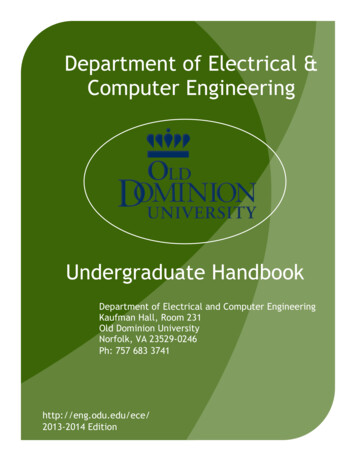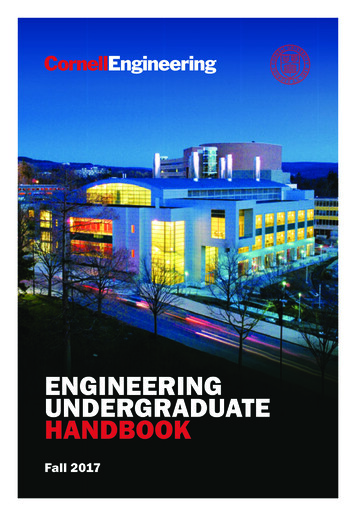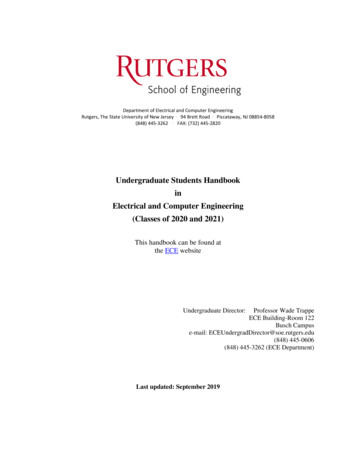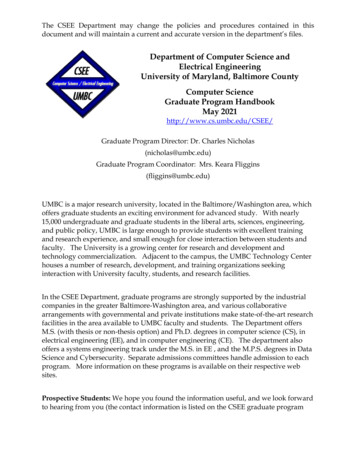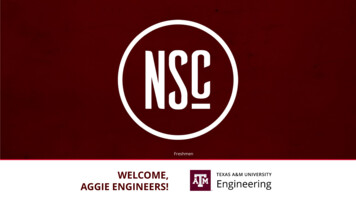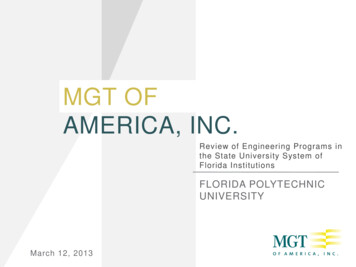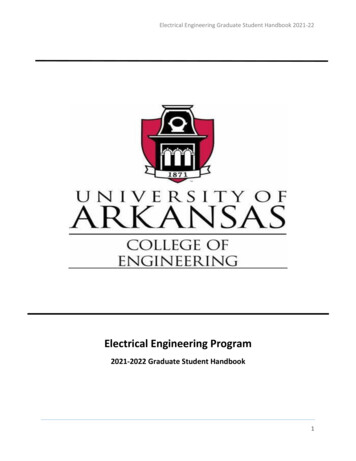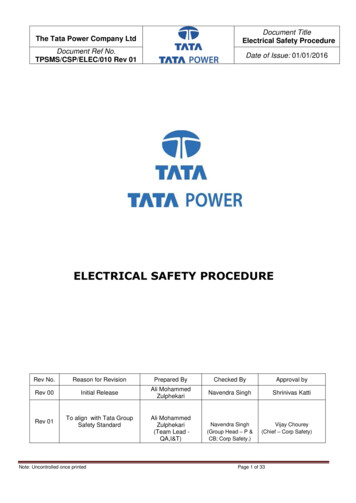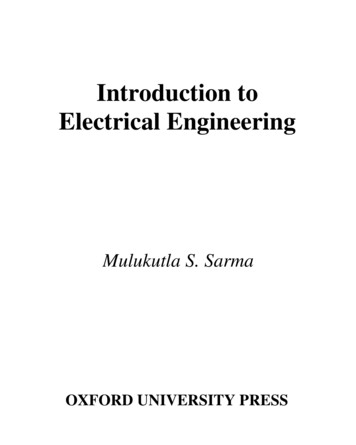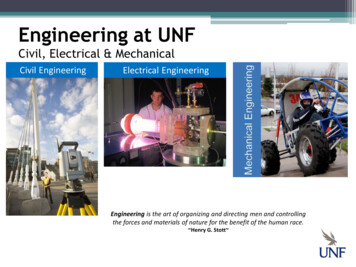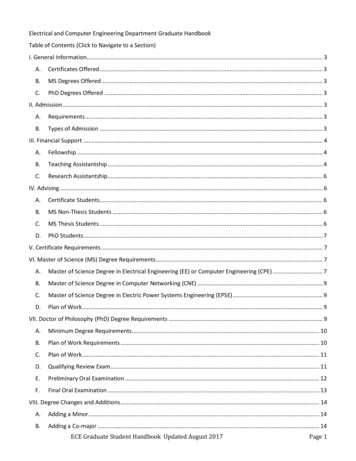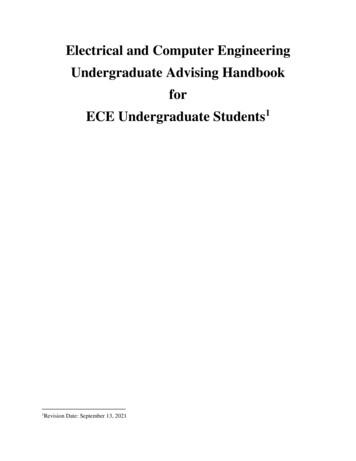
Transcription
Electrical and Computer EngineeringUndergraduate Advising HandbookforECE Undergraduate Students11Revision Date: September 13, 2021
Table of ContentsIntroductionElectrical Engineering Degree: Course Advising SheetElectrical Engineering: Suggested Course Combinations for Various Job TitlesElectrical Engineering Degree: Flow ChartComputer Engineering Degree: Course Advising SheetComputer Engineering Degree: Flow ChartComputer Engineering Degree - Software Engineering Option: Course Advising SheetComputer Engineering Degree - Software Engineering Option: Flow ChartElectrical Engineering and Computer Engineering Dual Degree: Course Advising SheetElectrical Engineering, Computer Engineering, and Software Engineering: Course Advising SheetSummary: Electrical and Computer Engineering 2000, 3000, and 4000 level coursesElectrical and Computer Engineering Faculty List
Introduction 1The School of Electrical and Computer Engineering (ECE) has compiled this advising handbookfor undergraduate students to assist them with the selection of their courses and to help themcomplete their degree in a timely and orderly fashion. This handbook is not intended to replace orsupersede the official degree sheets for the Bachelor of Science (BS) in Electrical Engineering(EE) or the BS in Computer Engineering (CpE) degree programs. The student is expected to meet allrequirements listed on the official Degree Requirement Sheet corresponding to the year of matriculation.Per the University Catalog: “The responsibility for satisfying all requirements for a degree restswith the student. Advisers, faculty members and administrators offer help to the student inmeeting this responsibility.”Upon admission into ECE as either a new student or transfer student, a student is assigned anAcademic Staff Adviser. That adviser will assist students with course selections, prerequisitecompliance, degree audit, graduation requirements, and other nuances associated with the ECEprograms. Once enrolled in ECEN 3714, Network Analysis, the student will also be assigned anECE Faculty Adviser. Students are strongly encouraged to discuss with their faculty adviser allaspects of the ECE curriculum and inquire about the career and technologies of electricalengineering and/or computer engineering. The faculty adviser assignment can be found usingBanner (https://my.okstate.edu).Many lower division ECE courses have rigorous “C or better” prerequisites. For example, a “C”or better grade in ECEN 2714, MATH 2233, and PHYS 2114 is required to be enrolled in ECEN3714. Students who do not satisfy such prerequisites will not be allowed to enroll in the intendedcourse (e.g., ECEN 3714) or stay enrolled if they “slip” through the enrollment system. Studentsare strongly encouraged to review course listings in the OSU General Catalog to be fully informedabout any course and its prerequisites.Transfer students are encouraged to discuss previously completed courses taken at a non-OSUuniversity with their academic adviser. Transferable courses are determined on a case-by-casebasis unless an articulation agreement has been established between OSU and the non-OSUuniversity. Students who wish to transfer a course as an equivalent ECEN course must have earneda “C” or better in that course and taken it from an ABET (or equivalent) accredited institution. Inmost cases, the School does not accept engineering technology courses.Students pursuing the BS degree in Electrical Engineering (BSEE) are given the opportunityduring their junior year and senior year to take courses that align with their personal interests andcareer goals. These “elective” courses cover many electrical engineering sub-disciplines includinga) communications (Com), control systems, and digital signal processing (DSP), b) electric power1Revised September 13, 2021
and energy, c) computer architecture, embedded systems, and digital electronics, d) solid-state andanalog electronics, and e) microwaves and photonics. ECE faculty can provide advice about thealignment of a student’s career goals with any given sub-discipline. To facilitate a conversationbetween BSEE students and faculty, the following list provides a brief overview of each subdiscipline: Communications: wireless technologies, internet, information theory, data networks,encryption, security, digital and analog modulation, encoding and decoding, noise,telecommunications, GPS, internet-of-things Control Systems: Robotics, mechatronics, autonomous vehicles, embedded control,feedback, compensation, stability, neural networks, optimization, intelligent systems Digital Signal Processing: Machine vision, artificial intelligence, pattern and voicerecognition, speech synthesis, video and image processing, digital filters, analog/digitalinterfaces, data mining, graphical processors Electric Power and Energy: Generation, transmission, electric machines, protection, smartand micro-grids, power electronics, electric drives, electro-mechanical transducers,sustainability, renewable energy, energy storage, reliability, batteries, energy conversionand transformation Computer Architecture, Embedded Systems, and Digital Electronics: Computerarchitectures, VLSI design, central and graphical processing units, networking, memoryand storage devices, software engineering and coding, embedded controllers, computerarithmetic, internet-of-things, cloud computing, sequential and combinational logic,peripherals Solid-State and Analog Electronics: Transistors, diodes, semiconductors, microelectronics,transmitters, receivers, amplifiers, mixers, detectors, regulators, mixed-signal devices,filters, operational amplifiers, oscillators, instrumentation, high speed and low powerdevices, systems-on-a-chip Microwaves and Photonics: Radar, lasers, LIDAR, antennas, wireless transmission, fiberoptics, THz communications, medical diagnostics and surgery, beamforming, wavescattering, electromagnetic interference, lumped and distributed circuits, optoelectronics,holography, LED’s, photodetectors, imaging systems, spectroscopyStudents pursuing the BS degree in Computer Engineering (BSCpE) are by default taking a set ofcourses in Computer Architecture, Embedded Systems, and Digital Electronics with additionaltopics in computer science, including discrete mathematics, programming, data structures, andoperating systems. Computer Engineering students have the opportunity to enroll in the SoftwareEngineering Option (BSCpE SOFT). This option adds three credit hours to the BSCpE degreeprogram and specifies a total of 12 credit hours of software-specific courses that need to be taken.Students also have the option to pursue a dual degree in electrical engineering and computerengineering (BSEE BSCpE). This dual degree program requires 137 credit hours to complete (i.e.,
12 credit hours beyond the BSCpE program plus ENSC 2113, Statics). In principle, it can becompleted in four years by taking approximately 17 credit hours each semester.Likewise, Students can pursue a BSEE and BSCpE dual degree with a Software EngineeringOption (BSEE BSCpE SOFT). This joint degree program requires 143 credit hours to complete.In principle, it can be completed in four years by taking approximately 18 credit hours eachsemester.In addition to the dual degree program, the School also offers a “4 1” program that combines theBSEE or BSCpE program with the School’s Master of Engineering in Electrical Engineering(MEngEE) program. Effectively, this program adds 24 credit hours of graduate courses to theBSEE/BSCpE programs to obtain a BSEE/BSCpE degree and MEngEE degree, thus suggestingthat the program requires four years to complete the BSEE/BSCpE degree and one year tocomplete the MEngEE degree (i.e., “4 1”). Specific details of the “4 1” program can be foundon the web in the “Memorandum to Graduate Students”; see https://ece.okstate.edu/.Students are highly encouraged to discuss the BSEE BSCpE, BSCpE SOFT,BSEE BSCpE SOFT, and “4 1” programs with their faculty and school advisers. These valueadded programs have been devised to provide students a competitive edge in the workforce bygiving them broader and deeper knowledge of the electrical and computer engineering disciplines.Cooperative (co-op) experiences are oftentimes available that allow a student to earn credittowards their degree while being employed at a participating organization. Such experiences allowa student to be educated in a real-world setting about the engineering profession. When suchexperiences are available with participating organizations, students, with department permission,can enroll in ECEN 4030. The number of credit hours assigned to the co-op experience isdetermined on a case-by-case basis in accordance with the nature and duration of the proposedwork. Department permission must be granted to enroll in co-op courses and to allow such coursesto be applied to the degree requirements. Summer employment and/or internships do notnecessarily qualify without preapproval from ECE.Course advising sheets for ECE’s various degree programs are available in this Handbook. Flowcharts are also provided to show how some of these programs can be potentially completed in fouryears.This handbook also lists the 2000, 3000, and 4000 level courses offered by the ECE along withtheir corresponding course catalog entries. In most cases, the ECEN course numbering schemeadheres to the following algorithm: ECEN ABXY: A 1 Freshman Course A 2 Sophomore Course
A 3 Junior Course A 4 Senior Course A 5 Graduate Course A 6 PhD Course B 1 Electric Power and Energy B 2 Computer Architecture, Embedded Systems, and Digital Electronic B 3 Solid-State and Analog Electronics B 4 Control Systems B 5 Communications B 6 Microwaves and Electromagnetics B 7 Signal Processing B 8 Photonics X 1,2 ,9 for any given course in an area Y Number of credit hours (CH)For example, ECEN 4613 is a three credit hour, senior level course in the area of microwaves 2.A list of the ECE faculty is provided in this handbook along with their area of specialization. Ingeneral, all faculty will be able to advise any undergraduate student. However, students areencouraged to contact any faculty member to get detailed information about any area or course.The number of occupations associated with electrical engineering or computer engineering is quitelarge—too large to tabulate within this document. However, some course lists are provided thatmay be applicable for various generic position titles. The courses on the list are suggested courses;students have the flexibility to pick and choose courses as they see fit in accordance with thishandbook and the official degree sheets.2It should be noted that ECE is the name of the School (i.e., School of ECE); ECEN is the four letter OSU courseprefix (e.g., ECEN 4613).
Electrical Engineering (124 CH): Course Advising Sheet 1I. Required Courses (91 CH): ENGL 1113, POLS 1113, HIST 1103, ENGL 3323ENGR 1111, ENSC 2113, ENSC 2611, IEM 3503CS1113, CS 2433MATH 2144, MATH 2153, MATH 2233, MATH 2163, MATH 3013CHEM 1414, PHYS 2014, PHYS 2114ECEN 2714, ECEN 3213, ECEN 3233, ECEN 3314, ECEN 3513, ECEN 3613, ECEN3714, ECEN 3903, ECEN 4013, ECEN 4024, ECEN 4503II. ECEN Junior Elective (3 CH): Choose one course from the following list. (Dependingdepartmental resources and instructor availability, courses on this list may or may not be offeredin any given academic year or semester.) ECEN 3113 - Energy, Environment and EconomicsECEN 3623 - Applied Fields and Waves IIECEN 3723 - Systems IECEN 3913 - Solid State Electronic DevicesIII. ECEN Electives (18 CH): Choose six ECEN courses, not previously chosen, from thefollowing list. (Depending on departmental resources and instructor availability, courses on thislist may or may not be offered in any given academic year or semester. Note that ECEN 3723 is aprerequisite to ECEN 4413. All of other courses listed below only have required courses asprerequisites.) 1ECEN 3113 - Energy, Environment and EconomicsECEN 3623 - Applied Fields and Waves IIECEN 3723 - Systems IECEN 3913 - Solid State Electronic DevicesECEN 4133 - Power ElectronicsECEN 4153 - Power System Analysis and DesignECEN 4213 - Embedded Computer Systems DesignECEN 4233 - High Speed Computer ArithmeticECEN 4243 - Computer ArchitectureECEN 4273 - Software EngineeringECEN 4283 - Computer NetworksECEN 4303 - Digital Integrated Circuit DesignECEN 4313 - Linear Electronics Circuit DesignECEN 4353 - Communication ElectronicsRevision Date: September 13, 2021
ECEN 4413 - Automatic Control SystemsECEN 4523 - Communication TheoryECEN 4533 - Data CommunicationsECEN 4613 - Microwave EngineeringECEN 4743 - Introduction to Biomedical Engineering Modeling and SystemsECEN 4763 - Introduction to Digital Signal ProcessingECEN 4773 - Real Time Digital Signal ProcessingECEN 4823 - Design of Optical SystemsECEN 4843 - Design of Lasers and SystemsIV. Controlled Elective (3 CH): Choose a) ENSC 2123, ENSC 2143, ENSC 2213, ENSC 3233, orENSC 3313, or b) any course, 3000 level or above from ECEN, BAE, MAE, CIVE, IEM, PHYS,MATH, CHEM, STAT, or CS. Exclusions or with ECE approval (and in some cases, approvalfrom other departments): All ENGR CoursesECEN 3020BAE 4001, BAE 4012, BAE 4400CHEM 4990CIVE 4010, CIVE 4041, CIVE 4043CS 3570, CS 4570, CS 4993IEM 4010, IEM 4020, IEM 4913, IEM 4931MAE 4010, MAE 4342, MAE 4344, MAE 4353, MAE 4354, MAE 4363, MAE 4374MATH 3403, MATH 3603, MATH 3910, MATH 3933, MATH 4033, MATH 4590,MATH 4900, MATH 4910PHYS 4010, PHYS 4712, PHYS 4993STAT 4053, STAT 4063, STAT 4910, STAT 4981, STAT 4991, STAT 4993V. Humanities, Social Science, International, & Diversity Electives (9 CH): A total of at least 6credits designated as “H” and 3 credits designated as “S” is required. Of these, 3 CH must meetthe International Dimensions “I” component and 3 CH must meet the Diversity “D” component.VI. Co-Op Experience (6 CH maximum): With department pre-approval, student may enroll inECEN 4030 to get degree credit for their co-op experience. Depending on the agreement with aparticipating organization, a student may receive between one to six credit hours for theirexperience. Multiple experiences are allowed with permission. Up to three credit hours of co-opexperience may be applied to the Controlled Elective degree requirement and up to an additionalthree credit hours of co-op experience may be applied to the ECEN Elective degree requirementfor a maximum of six credit hours. Note: The Controlled Elective is satisfied first before theECEN Elective requirement.
BSEE Program: Suggested Course Combinations for Various Job Titles 1The following lists are suggested courses that a student may wish to take as electives for a givenjob title. Students, however, may mix and match courses as they see fit. Although the number ofjob titles is quite large, the following titles are representative of common titles found in industryand laboratories.Communications Systems Engineer: ECEN 3723, Systems I ECEN 4523, Communication Theory ECEN 4533, Data Communications ECEN 4763, Intro to Digital Signal ProcessingControl Systems Engineer: ECEN 3723, Systems I ECEN 4413, Automatic Control Systems (Prereq. ECEN 3723) ECEN 4763, Intro to Digital Signal Processing ECEN 4773, Real-Time Digital Signal Processing (Prereq. ECEN 4673)Digital Hardware Designer and/or Computer Architect: ECEN 4233, High-Speed Computer Arithmetic ECEN 4243, Computer Architecture ECEN 4303, Digital Integrated CircuitsElectronics Engineer: ECEN 3723, Systems I ECEN 4303, Digital Integrated Circuit Design ECEN 4313, Linear Electronics Circuit Design ECEN 4353, Communication ElectronicsEmbedded or Computer Systems Engineer: ECEN 4243, Computer Architecture ECEN 4273, Software Engineering ECEN 4213, Embedded Computer System Design ECEN 4283/CS 4283, Computer NetworksMicrowave, Antenna or Radar Engineer: ECEN 3623, Applied Fields and Waves II ECEN 4353, Communication Electronics1Created: September 13, 2021
ECEN 4613, Microwave EngineeringECEN 4843, Design of Lasers and SystemsOptics and Photonics Engineer: ECEN 3623, Applied Fields and Waves II ECEN 3913, Solid State Electronic Devices ECEN 4613, Microwave Engineering ECEN 4843, Design of Lasers and SystemsPower Electronics Engineer ECEN 3113, Energy, Environment and Economics ECEN 3913, Solid State Electronic Devices ECEN 4133, Power Electronics ECEN 4153, Power System Analysis and DesignPower Systems Engineer: ECEN 3723, Systems I ECEN 3113, Energy, Environment and Economics ECEN 4133, Power Electronics ECEN 4153, Power System Analysis and DesignRadio Frequency (RF) Systems Engineer: ECEN 3723, Systems I ECEN 3623, Applied Fields and Waves II ECEN 4353, Communication Electronics ECEN 4613, Microwave EngineeringSignal Processing Engineer: ECEN 3723, Systems I ECEN 4743, Introduction Biomedical Engineering (Prereq. ECEN 4673) ECEN 4763, Introduction to Digital Signal Processing ECEN 4773, Real-Time Digital Signal Processing (Prereq. ECEN 4673)
Electrical Engineering Course Plan (EE)Semester 115 Credit HoursSemester 216 Credit HoursCS2433CS 1113ECEN3213CS 2433Comp. Science ISemester 315 Credit Hours2/2CS11133/0MATH2153PHYS2114ENSC2113PHYS 2014Intro to EngrGeneral Physics I1/1MATH2144MATH 2144Calculus 14/03/2, Note 6PHYS2014Calculus II3/2, Note 1MATH2144ENGL3323Freshman Comp I3/0, Note 23/0ECEN3714ECEN39033/2, Note 6ECEN 2714MATH2153MATH 2153Gen TH2163PHYS2014MATH2144ECEN36133/0ECEN 3903PHYS2114ECEN37143/0ECEN 3714Network AnalysisECEN2714MATH2233PHYS21143/2, Note 4,5ECEN 3213StaticsComp Based SystemsCS C 21133/0ECEN3314Intro Semicon DevFund Elec Circuits2/2Course NumberGeneral Physics IIDigital Logic DesCHEM 1414MATH 2163Calculus III3/0PHYS 2114ECEN4013ECEN 3233MATH2153ENSC2113PHYS2014ECEN3714Diff EquationsENGR 1111ENGL 1113MATH 2233C/C ProgSemester 416 Credit HoursECEN40132/2, Note 8POLS 1113ENSC 2611American Gov’tElec Fab LabAmerican History3/00/23/0HIST 1103SubsequentRequirement**Course NamePrerequisites*Lecture/LabSee Note #OSU Requirement*Only the last prerequisite in a sequence is listed. All earlier prerequisitesmust also be satisfied before taking the course.**See your Advisor, the ECE Advising Document, and Banner for additionalinformation.CEAT RequirementECE RequirementElectiveSuggested Course PlanThe anticipation at OSU and most institutions of higher education is that for onesemester credit hour (SCH) the student spends one hour per week in lecture(two for lab courses) and two hours studying outside of class (one for labcourses). A three credit hour class requires about nine hours per week. Thisstudy plan is recommended for students who will devote full time to universitystudies and do not have excessive extracurricular activities or other obligations.NOTES:1) CHEM 1515 may be substituted for CHEM 1414 and should be taken by all students considering medical school.2) Students with less than a “B” in ENGL 1113 or 1313 must take ENGL 1213 or 1413 prior to ENGL 3323.3) A total of at least 6 hours designated “H” and 3 hours designated “S” is required. Of these, 3 hrs must meet theInternational Dimension “I” component and 3 hrs must meet the Diversity “D” component.4) ECEN 2714 replaces ENSC 2613 effective fall 2018.5) MATH 2233 and PHYS 2114 must be taken prior to or at the same time as ECEN 2714.6) General Physics I and II are key prerequisites and should be taken at the earliest possible time.7) Must be at least 3 SCH.8) ECEN 3213 replaces ENSC 3213.
Electrical Engineering Course Plan (EE)Semester 516 Credit HoursSemester 615 Credit HoursECEN4013Semester 715 Credit 714ENGL3323IEM 3503ENGL 3323Engr EconomicsTechnical WritingENGL11133/0MATH2153ECEN3613ECEN4013ECEN 3513Appl Fields tr Dev &ApplVARIES3/0VARIESECEN3513VARIES3/0, Note 7Note 7“H” Elective(3)“S” Elective(3)Note 3,7Note 3,7ECEN 4024Capstone DesignDesign Engr Sys1/41/8ECEN4013ECEN Elective(3)ECEN 4503 This flowchart represents one path of many to graduation. Students are not requiredto follow the chart, but prerequisites limit path options. This flowchart is only an advising instrument. When conflicts occur, the official 20212022 Degree Requirement Sheet takes precedence. Always check for the most currentversion of this flowchart. Be sure to pay careful attention to the prerequisite requirements, grade requirements,and other official information on Banner. Some prerequisites also have minimum graderequirements. Grade requirements are not shown on this flowchart. Consult your Advisor if you have any questions or need clarification.3/0VARIESVARIESNote 7ECEN Elective(3)VARIESNote 7ECEN Elective(3)VARIESNote 7Note 7ECEN Elective(3)ECEN Elective(3)ECEN Elective(3)MATH 3013ECEN4024ECEN 4013Random Signals3/0ECEN JuniorElective (3)Linear AlgebraMATH2153ECEN4503ECEN4013Signal AnalysisECEN 3314ENSC2611ECEN3714ECEN39033/0Semester 816 Credit HoursVARIESNote 7Controlled Elective(3)Note 7“H” Elective(3)Note 3,7No prerequisites, notprerequisite for anotherclassHas prerequisites, isprerequisite for anotherclassNo prerequisites, isprerequisite for anotherclassHas prerequisites, notprerequisite for anotherclassRev. 1.0 4-6-2021
Computer Engineering (125 CH): Course Advising Sheet 1I. Required Courses (107 CH): ENGL 1113, POLS 1113, HIST 1103, ENGL 3323ENGR 1111, ENSC 2611, IEM 3503CS 1113, CS 2433, CS 2351, CS 3353, CS 3653; CS 4323 or ECEN 4283.MATH 2144, MATH 2153, MATH 2233, MATH 2163, MATH 3013CHEM 1414, PHYS 2014, PHYS 2114ECEN 2714, ECEN 3213, ECEN 3233, ECEN 3314, ECEN 3513, ECEN 3613, ECEN3714, ECEN 3903, ECEN 4013, ECEN 4024, ECEN 4213, ECEN 4243, ECEN 4303,ECEN 4503II ECEN Electives (6 CH): Choose two ECEN courses from the following list. (Depending ondepartmental resources and instructor availability, courses on this list may or may not be offeredin any given academic year or semester. Note that ECEN 3723 is a prerequisite to ECEN 4413.All of other courses listed below only have required courses as prerequisites.) ECEN 3113 - Energy, Environment and EconomicsECEN 3623 - Applied Fields and Waves IIECEN 3723 - Systems IECEN 3913 - Solid State Electronic DevicesECEN 4133 - Power ElectronicsECEN 4153 - Power System Analysis and DesignECEN 4273 - Software EngineeringECEN 4283 - Computer NetworksECEN 4313 - Linear Electronics Circuit DesignECEN 4353 - Communication ElectronicsECEN 4413 - Automatic Control SystemsECEN 4523 - Communication TheoryECEN 4533 - Data CommunicationsECEN 4613 - Microwave EngineeringECEN 4743 - Introduction to Biomedical Engineering Modeling and SystemsECEN 4763 - Introduction to Digital Signal ProcessingECEN 4773 - Real Time Digital Signal ProcessingECEN 4823 - Design of Optical SystemsECEN 4843 - Design of Lasers and SystemsIII. Controlled Elective (3 CH): Choose a) ENSC 2113, ENSC 2123, ENSC 2143, ENSC 2213,ENSC 3233, or ENSC 3313, or b) any course, 3000 level or above from ECEN, BAE, MAE, CIVE,1Revision Date: September 13, 2021
IEM, PHYS, MATH, CHEM, STAT, or CS. Exclusions or with ECE approval (and in some cases,approval from other departments): All ENGR CoursesECEN 3020BAE 4001, BAE 4012, BAE 4400CHEM 4990CIVE 4010, CIVE 4041, CIVE 4043CS 3570, CS 4570, CS 4993IEM 4010, IEM 4020, IEM 4913, IEM 4931MAE 4010, MAE 4342, MAE 4344, MAE 4353, MAE 4354, MAE 4363, MAE 4374MATH 3403, MATH 3603, MATH 3910, MATH 3933, MATH 4033, MATH 4590,MATH 4900, MATH 4910PHYS 4010, PHYS 4712, PHYS 4993STAT 4053, STAT 4063, STAT 4910, STAT 4981, STAT 4991, STAT 4993IV. Humanities, Social Science, International, & Diversity Electives (9 CH): A total of at least 6credits designated as “H” and 3 credits designated as “S” is required. Of these, 3 CH must meetthe International Dimensions “I” component and 3 CH must meet the Diversity “D” component.V. Co-Op Experience (6 CH maximum): With department pre-approval, student may enroll inECEN 4030 to get degree credit for their co-op experience. Depending on the agreement with aparticipating organization, a student may receive between one to six credit hours for theirexperience. Multiple experiences are allowed with permission. Up to three credit hours of co-opexperience may be applied to the Controlled Elective degree requirement and up to an additionalthree credit hours of co-op experience may be applied to the ECEN Elective degree requirementfor a maximum of six credit hours. Note: The Controlled Elective is satisfied first before theECEN Elective requirement.
Computer Engineering Course Plan (CpE)Semester 115 Credit HoursSemester 217 Credit HoursCS2433CS2351CS 1113ECEN3213CS3353CS 2433Comp. Science ISemester 315 Credit HoursMATH 2233C/C Prog2/2CS11133/0MATH2153PHYS 2014PHYS 2114Intro to EngrGeneral Physics IGeneral Physics IIMATH 2144Calculus IMATH2153PHYS2014CS36533/2, Note 5PHYS2014ECEN 3233Digital Logic DesECEN4213ECEN4243ECEN4013ECEN43032/24/0Calculus IIGen Chemistry3/2, Note 1MATH2144ENGL 11133/0ENGL3323Freshman Comp I3/0, Note 23/03/0ECEN 3903PHYS2114ECEN3714ECEN33143/0ECEN 3714Network AnalysisECEN2714MATH2233PHYS2114ECEN 3213Comp Based EN40133/2CS3353Discrete MathENSC 2611ECEN3613Intro Semicon Dev3/2, Note 4,7CS 3653MATH2144American Gov’tECEN3714ECEN3903Fund Elec S 1113MATH21533/2, Note 5ECEN 2714MATH2153MATH 2153CHEM 1414MATH 2163Calculus III3/0ENGR 1111MATH2144ECEN3714Diff EquationsPHYS21141/0Semester 416 Credit HoursECEN4013ECEN4243ECEN4213CS43232/2HIST 1103Elec Fab LabAmerican History0/23/0CS 2351UNIX ProgCourse NumberSubsequentRequirement**Course NamePrerequisites*Lecture/LabSee Note #OSU RequirementCS11131/0*Only the last prerequisite in a sequence is listed. All earlier prerequisitesmust also be satisfied before taking the course.**See your Advisor, the ECE Advising Document, and Banner for additionalinformation.CEAT RequirementECE RequirementElectiveSuggested Course PlanThe anticipation at OSU and most institutions of higher education is that for onesemester credit hour (SCH) the student spends one hour per week in lecture(two for lab courses) and two hours studying outside of class (one for labcourses). A three credit hour class requires about nine hours per week. Thisstudy plan is recommended for students who will devote full time to universitystudies and do not have excessive extracurricular activities or other obligations.NOTES:1) CHEM 1515 may be substituted for CHEM 1414 and should be taken by all students considering medical school.2) Students with less than a “B” in ENGL 1113 or 1313 must take ENGL 1213 or 1413 prior to ENGL 3323.3) A total of at least 6 hours designated “H” and 3 hours designated “S” are required. Of these, 3 hrs must meet theInternational Dimension “I” component and 3 hrs must meet the Diversity “D” component.4) ECEN 2714 replaces ENSC 2613 effective fall 2018.5) General Physics I and II are key prerequisites and should be taken at the earliest possible time.6) Must be at least 3 SCH.7) MATH 2233 and PHYS 2114 must be taken prior to or at the same time as ECEN 2714.8) Either CS 4323 or ECEN 4283 (if not previously used) is acceptable. Refer to the CpE Course Advising Sheet.
Computer Engineering Course Plan (CpE)Semester 516 Credit HoursSemester 615 Credit HoursECEN4013Semester 715 Credit 714ENGL3323IEM 3503ENGL 3323Engr EconomicsTechnical WritingENGL11133/0ECEN3613MATH2153ECEN4013ECEN 3513Appl Fields EN4503ECEN4013ECEN3714ECEN4013ECEN4303Electr Dev led Elective(3)3/0ECEN 4303Dig Elec Ckt DesECEN3233ECEN33142/2VARIESNote 6CS 4323CS2433Op SystemsECEN3213CS33533/0, Note 8CS3653ECEN Elective (3)ECEN 4213Emb Comp SysNote 63/0VARIESCS4323CS 33530/8ECEN4013Comp ArchLinear AlgebraMATH2153Design Engr Sys2/2ECEN 42433/0ECEN 4024Capstone DesignRandom SignalsECEN Elective (3)MATH 3013ECEN4024ECEN 4013ECEN 4503Signal Analysis3/0ECEN 33143/0Semester 816 Credit HoursECEN3213ECEN3233ECEN37142/2Note 6VARIES“H” Elective(3)“S” Elective(3)Note 3,6Note 3,6“H” Elective(3)Data StructuresCS2433CS36533/0 This flowchart represents one path of many to graduation. Students are not requiredto follow the chart, but prerequisites limit path options. This flowchart is only an advising instrument. When conflicts occur, the official 20212022 Degree Requirement Sheet takes precedence. Always check for the most currentversion of this flowchart. Be sure to pay careful attention to the prerequisite requirements, grade requirements,and other official information on Banner. Some prerequisites also have minimum graderequirements. Grade requirements are not shown on this flowchart. Consult your Advisor if you have any questions or need clarification.Note 3,6No prerequisites, notprerequisite for anotherclassHas prerequisites, isprerequisite for anotherclassNo prerequisites, isprerequisite for anotherclassHas prerequisites, notprerequisite for anotherclassRev. 1.0 4-6-2021
Computer Engineering plus Software Engineering Option (128 CH)Course Advising Sheet 1I. Required Courses (107 CH): ENGL 1113, POLS 1113, HIST 1103, ENGL 3323ENGR 1111, ENSC 2611, IEM 3503CS 1113, CS 2433, CS 2351, CS 3353, CS 3653, CS 4323MATH 2144, MATH 2153, MATH 2233, MATH 2163, MATH 3013CHEM 1414, PHYS 2014, PHYS 2114ECEN 2714, ECEN 3213, ECEN 3233, ECEN 3314, ECEN 3513, ECEN 3613, ECEN3714, ECEN 3903, ECEN 4013, ECEN 4024, ECEN 4213, ECEN 4243, ECEN 4303,ECEN 4503II. BSCpE/SOFT Requirement (12 CH): CS 3363 - Organization of Programming LanguagesECEN 4273 - Software EngineeringECEN 4283 - Computer NetworksChoose one of the following:o CS 4153 -
Sep 13, 2021 · The School of Electrical and Computer Engineering (ECE) has compiled this advising handbook for undergraduate students to assist them with the selection of their courses and to help th
